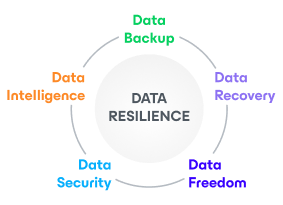My career has taken me from law enforcement to IT. I went from investigating cybercrimes to running my own MSP company before deciding I wanted a job that was purely focused on technology. Today, I’m the lead network administrator at SGMC Health. Never has the responsibility to keep systems running and data safe felt so important.
When Lives Depend on Data
People are often intrigued to hear that I swapped a life in law enforcement for network administration. However, those who question my choice usually don’t understand how much modern organizations rely on data. As a result, they don’t understand how much this work can positively affect lives. The amount of data streaming through a hospital each day is truly staggering, and preserving that flow is critical.
When patients come to our hospital, they’re already in a vulnerable state, and the last thing they want to worry about is whether their data is in safe hands. Equally, when doctors and clinicians are providing potentially life-saving care, the last thing they want to be concerned about is whether they can access the data they need to do their jobs properly. That said, managing a hospital’s IT network is no easy task. It’s like being at a cocktail party with 100 different people, each speaking a different language and ensuring they can communicate with each other. There’s always rerouting to be done and fires to be put out, and I thrive on this.
Rising to the Challenge
It’s my job to keep fears about data loss and downtime at bay. For the last five years, I’ve chosen Veeam to help me out, and it has done so at every turn. Our Veeam sales representative blew us away with the depth of her knowledge: There was no hard sell, just practical demos that showed us the impact Veeam would have on our data protection strategy. Through Veeam, we’ve introduced a myriad of safeguards and practices to protect data from ransomware — I don’t know how any IT administrator could sleep at night without taking similar measures.
Everything I’ve learned about data protection comes from Veeam, since I previously had no frame of reference beyond the basics of data backup and replication. Since becoming a Veeam customer, I’ve gone through several Veeam certifications, all of which have shown me how to set Veeam up to get the most out of the technology. Since then, my own capabilities have gone from strength to strength alongside Veeam’s frequently released functionalities that are always new and exciting. As a fan of exploring alternative solutions for compute, storage, and so on, we’ve been thrilled to see how Veeam’s support has matured over the years. I’m also currently wrapping my head around the new AI-enabled features from Veeam, which I’m sure will save so much time in the future.
Finding New Applications
One of the biggest challenges I currently face is balancing risk and reward. In other words: How do we advance technologically without opening up new vulnerabilities? Cybercriminals are always lurking, ready to exploit changes in our IT environment. At the same time, staying still would mean missing out on innovations as they emerge and the incredible effect they could have on patient care.
Many healthcare organizations shy away from the cloud and are nervous to put their data anywhere but on-premises. However, with help from Veeam, we’ve embraced a cloud strategy that delivers tons of value while keeping our data ultra-secure.
Critically, Veeam played a key role in enabling migration between multiple hypervisor solutions. When deciding how we would migrate our data to new and dissimilar environments, I had a lightbulb moment. With Veeam, we could easily replicate our data before recovering it in its new home! I had responsive Veeam support available if I had any questions, but as it turned out, I didn’t need it. Our move to these alternative platforms was seamless!
Spoiled by Choice
Best of all, with Veeam, I’m confident that our data is just as well-protected in the cloud as it was on-premises — and that we could extend that protection to other cloud environments too. That’s especially handy since we’re always introducing more and more repositories (both in the cloud and on-premises) to give us extra layers of resilience. I also don’t have any concerns about Veeam working effectively with any new storage or server hardware.
It’s so liberating to have a data protection solution that never introduces compatibility issues. To me, that represents true data portability and means we can continue to serve our patients and clinicians as best as we can.
